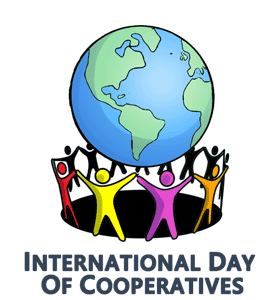Context:
India celebrated the fourth anniversary of the Ministry of Cooperation along with the International Day of Cooperatives on July 5.
More on the news
- The event happened in a year that was globally recognized as the United Nations International Year of Cooperatives.
- This coming together highlights the growing importance of the cooperative model in India’s development plans, especially as part of the Atmanirbhar Bharat (Self-Reliant India) vision.
Legal Provisions for Cooperatives in India
- Cooperatives in India are governed by both Central and State laws.
- The main law is the Cooperative Societies Act, 1912 which applies to societies in more than one state.
- Each state has its own law for cooperatives, like the Maharashtra Cooperative Societies Act, 1960.
- The 97th Constitutional Amendment (2011) gave constitutional status to cooperatives.
- It added Part IXB to the Constitution and included Article 43B (promotion of cooperatives) in the Directive Principles.
- It made the right to form cooperatives a fundamental right under Article 19(1)(c).
- The Multi-State Cooperative Societies Act, 2002 governs cooperatives working across states.
Cooperative in India:
- About 54% of India’s cooperative societies are from three major sectors housing, dairy and credit.
- Agriculture and rural cooperatives play significant roles in supplying timely and adequate credit and fertilizers and in supporting procurement of crops.
- While about 15% of total short-term credit is disbursed to 13 crore farmer members through 1 lakh Primary Agricultural Credit Societies (PACS), 30% of India’s total sugar production, 35% of fertilizer distribution, 20% of paddy and 13% of wheat procurement are steered through cooperatives.
- It is estimated that the share of cooperatives in total direct employment in India is 13.3 per cent.
Significance of MSME
In 2006, the Micro, Small, and Medium Enterprises Development Act, 2006 was passed setting definition criterion based on investment in plant and machinery. During 2020 and 2025, definitions were further revised to include turnover-based criteria.
- Employment Generation:
- MSMEs are the biggest source of non-farm jobs in India, especially for semi-skilled and unskilled workers, helping promote inclusive growth in both rural and urban areas.
- Digital tools and fintech have made it easier for small businesses to access finance and grow.
- Government schemes like PM Vishwakarma and Mudra Yojana (₹5.41 lakh crore sanctioned in FY24) have boosted self-employment.
- India has over 1 crore registered MSMEs, employing around 7.5 crore people.
- Contribution to GDP
- MSMEs contribute 30% to GDP and 45% to manufacturing output.
- They support large industries by supplying raw materials and intermediates.
- 4 crore MSMEs registered on Udyam portal (as of March 2024), boosting formal growth.
- Boosting Exports & Foreign Exchange
- MSMEs contribute 45.73% of India’s total exports (2023–24).
- Key sectors: textiles, leather, engineering goods.
- PLI scheme and GeM portal help them join global supply chains.
- Driving Digital
- 72% of MSME transactions are now digital.
- Supported by ONDC and ₹1 lakh crore innovation fund.
- Tech use is rising in sectors like aerospace and pharma.
- Employment & Livelihood Generation
- MSMEs employ around 7.5 crore people in India.
- Help semi-skilled and unskilled workers in urban and rural areas.
- Schemes like PM Vishwakarma and Mudra Yojana boost self-employment.
- Women Empowerment & Social Entrepreneurship
- 68% of Mudra loans have gone to women.
- 20.5% of Udyam-registered MSMEs are women-led.
- Women-led MSMEs promote gender equality and social impact.
Challenges for Cooperatives in India
- Many cooperatives, especially in villages, lack proper buildings and digital tools, which limits their work and market access.
- Too much government control and old laws affect their independence and smooth functioning.
- Poor management and favoritism in hiring reduce trust and stop cooperatives from growing professionally.
- People from weaker sections are often left out of leadership and decision-making in cooperatives.
Mains Question
Examine the role of MSMEs in contributing to India’s GDP and industrial growth. Highlight how formalization through digital platforms like the Udyam portal is influencing their impact. (10M, 150W)

